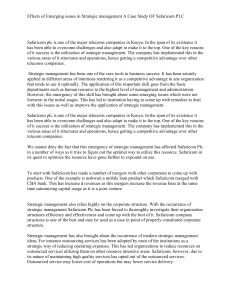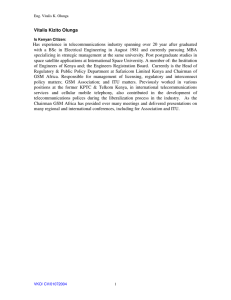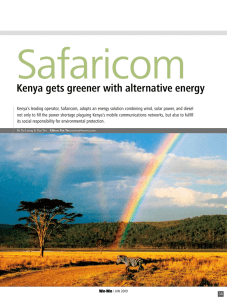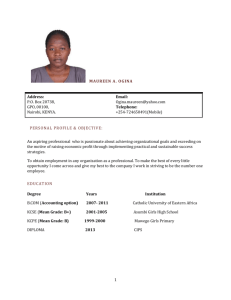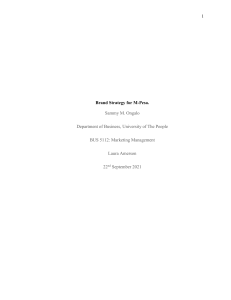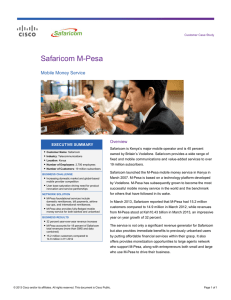CONSUMER PROTECTION IN DIGITAL FINANCE SUBTITLE
advertisement
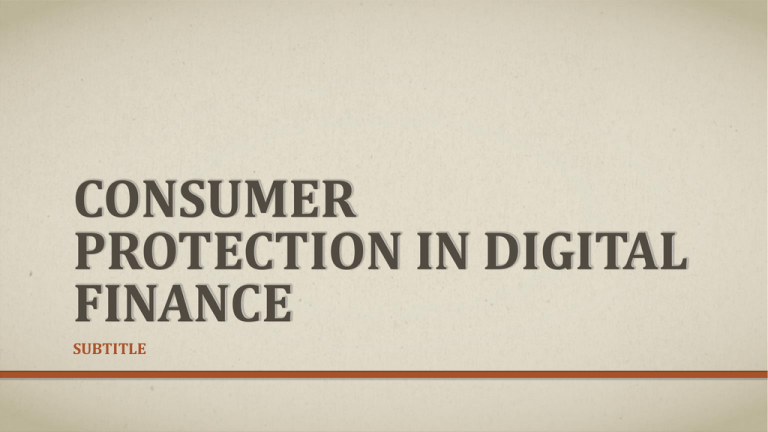
CONSUMER PROTECTION IN DIGITAL FINANCE SUBTITLE CONTENT LAYOUT Consumer protection and Competition Background to Digital Finance in Kenya Progress made and Challenges in Digital finance consumer protection Recommendations COMPETIITON AND CONSUMER PROTECTION WHAT IS COMPETITION? The process of rivalry between firms striving to gain sales and make profits Motive: Self interest The outcomes are mostly beneficial to the society as a whole i.e both producers and consumers Competition is a process It doesn’t happen automatically it is natured 4 BENEFITS OF COMPETITION Producer Benefit Market predictability Efficient allocation of resources Innovation Ease of market entry and exit Consumer Benefit Lower prices Better quality of goods More product (goods & services ) choice Easy access to goods and services 5 IMPEDIMENTS TO COMPETITION Government Policies Limits the number or range of suppliers Limits the ability of the suppliers to compete Reduce the incentives of supplier to compete limits the choice and information available to customers Anti-competitive practices Restrictive business conduct ( horizontal & vertical) Unfair trade practices ( misleading advert, tied-selling, false claims et al) Lack of awareness and understanding Lack of buy-in among policy makers Absence of public demand and support 6 CONSUMER RIGHTS & COMPETITION Article 46 of the Bill of Rights of the Kenyan Constitution state that : Consumers have the right-(a) to goods and services of reasonable quality; (b) to the information necessary for them to gain full benefit from goods and services; (c) to the protection of their health, safety, and economic interests; and (d) to compensation for loss or injury arising from defects in goods or services. Competition ensures fair play in the market giving the consumer more access, choice, quality and fair prices for the desired goods Competition Authority charged with the mandate of implementing the competition Act 2010. BRIEF BACKGROUND NUMBER OF REGISTERED MOBILE MONEY ACCOUNTS IN KENYA (IN MILLIONS) Series 1 25.3 26.3 21.1 19.2 16.4 8.9 5.3 1.3 2007 2008 2009 2010 2011 2012 2013 2014 MOBILE MONEY AGENTS Mobile money transfer Agents by service provider as at Jun 2014 In 2008 , there were 6,104 mobile money agents across the country Safaricom 80,230 As at June 2014 , there were a total of 116,196 mobile money agents; Airtel 10,990 Orange 9,231 Mobicash 7,765 Tangaza 1596 Yu 1072 Safaricom opens up its mobile agent network after complaints by Airtel Kenya amongst other players in 2014. DIGITAL FINANCE REGULATORY ENVIRONMENT In 2009 Finance Act 2009 allows for changes of banking act to include agent banking; In 2011, national payment systems act passed In 2012, antimoney laundering regulations issued; In 2014, national payment service commenced date announced; national payment service regulations issued; CONSUMER EXPERIENCE PROGRESS MADE IN PROTECTING CONSUMERS Consumers required to register their SIM cards to reduce fraud SIM cards that allow for customers to get contacts directly from the phone developed to reduce customers loosing money Safaricom example of showing the name of the person the transfer is to be made out to before sending, reducing customer complaints on lost money during transactions CURRENT CHALLENGES Current areas of concern Costs being passed on to the consumer – Eg. In 2013 when the 10 percent excise duty on fees charged was introduced, Safaricom also introduced new customer chargers on their transactions Consumer Right to Access and choice of mobile money services through mobile money agents There has been issues of access to other mobile money agents because of some anti-competitive practices Safaricom was engaged in Exclusive dealing with their mobile money agents. This is prohibited by the competition act 2010 section 21(1) In 2014 , reports showed that Safaricom finally opened up their mobile agent network Succession of Digital finance assets by consumers next of kin CHALLENGES….. Coordination amongst the various authorities on consumer protection and competition on the areas of convergence in digital finance Low levels of understanding amongst stakeholders on consumer protection and the benefits of competition to demand for competition in the digital finance market RECOMMENDATIONS Research on the level of competition in the digital finance market and put appropriate measures to ensure that consumers continue to benefit from the product Advocate for competition in the market More collaborative efforts between the sectoral regulators and the consumer protection agencies and Competition agencies in Kenya Increase consumer awareness campaigns on their rights in the mobile money market. THANK YOU

